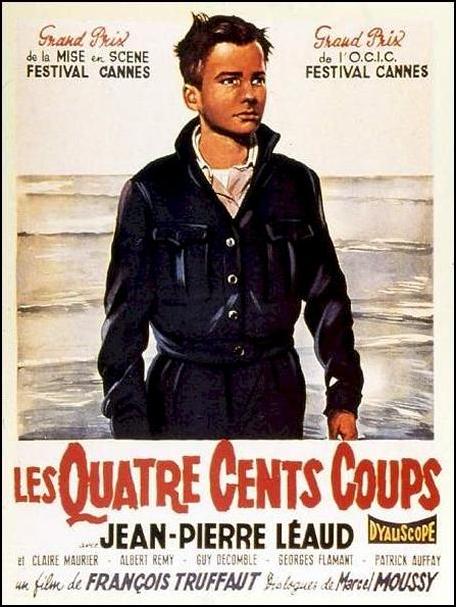- The 400 Blows
Infobox Film | name = The 400 Blows

caption= original film poster
amg_id = 1:256
imdb_id = 0053198
director =François Truffaut
writer = François Truffaut
Marcel Moussy
starring =Jean-Pierre Léaud Claire Maurier Albert Rémy Guy Decomble
producer = François Truffaut
music = Jean Constantin
cinematography =Henri Decaë
distributor = Cocinor
released = flagicon|FranceMay 4 ,1959
flagicon|USANovember 16 ,1959
runtime = 99 min
language = French"The 400 Blows" ( _fr. Les Quatre Cents Coups) is a 1959 French film directed by
François Truffaut . One of the defining films of theFrench New Wave , it displays many of the characteristic traits of the movement. The story revolves aroundAntoine Doinel , an ordinary adolescent inParis , who is thought by his parents and teachers to be a trouble maker.A semi-autobiographical film, reflecting events of Truffaut's and his friend's lives, its style amounts to Truffaut's personal history of French film — most notably a scene borrowed wholesale from
Jean Vigo 's "Zéro de conduite ". It is dedicated to the man who became his spiritual father,André Bazin , who died just as the film was about to be shot.Besides being a character study, the film is an exposé of the injustices of the treatment of juvenile offenders in France at the time.
Title
The English title is a straight translation of the French, but misses its meaning, as the French title refers to the expression "faire les quatre cents coups", which means "to raise hell". On the first American prints, subtitler and dubber Noelle Gilmore gave the film the title "Wild Oats", but the distributor did not like that title, and reverted it to "The 400 Blows", which led some to think the film covered the topic of corporal punishment. [Criterion Collection DVD of "Grand Illusion", see the section on press notes.]
ynopsis
Antoine is a French boy in his early teens who has troubles both at school and at home. His teacher singles him out for criticism and punishment. His mother is cold and demanding, and frequently argues with her husband, Antoine's stepfather. Antoine soon discovers that she is also having an affair with a coworker. The family is financially insecure, and Antoine must sleep in a sleeping bag on a cot crammed next to the back entrance to the apartment.
He engages in a childish mischief, often at the instigation of his friend René, but is caught and punished after each incident. He eventually pilfers a typewriter from his father's workplace, planning to pawn it. Antoine and René are unsuccessful in their attempt to pawn the typewriter, so Antoine returns to the office to return it. When he is apprehended by the concierge, his stepfather turns him in to the police.
After his arrest, Antoine's parents turn him over to the investigating magistrate, saying that he is incorrigible. Antoine's mother requests only that Antoine be sent to a work camp by the sea, as he has never seen the ocean before. After some time in a juvenile detention center Antoine is indeed sent on to a work camp near the sea.
During a session with the psychiatrist at the detention center, Antoine reveals that he had spent most of his childhood living with his grandmother. His own mother had not wanted to take care of him. In fact, she had not wanted a child at all, and had planned to have an
abortion .Antoine eventually escapes from the work camp. He runs towards the sea. The film ends as Antoine, kicking the surf at shoreline, turns and looks at the camera. The frame freezes on his face, which seems to gaze into the audience.
Cast
*
Jean-Pierre Léaud : Antoine Doinel
*Claire Maurier : Gilberte Doinel, the mother
*Albert Rémy : Julien Doinel
*Guy Decomble : School teacher (Sourpuss)
*Patrick Auffay : René Bigey
*Georges Flamant : Monsieur Bigey
*Pierre Repp : English Teacher
* The Children: Daniel Couturier, François Nocher, Richard Kanayan, Renaud Fontanarosa, Michel Girard, Henry Moati, Bernard Abbou, Jean-François Bergouignan, Michel Lesignor;
* Luc Andrieux, Robert Beauvais, Bouchon, Christian Brocard, Yvonne Claudie, Marius Laurey, Claude Mansard, Jacques Monod, Henri Virlojeux.Crew
* Photography by Henri Decaë
* Camera: Jean Rabier, asst.: Alain Levent, stills: André Dino
* Editing by Marie-Josèphe Yoyotte
* Music by Jean Constantin
* Sound by Jean-Claude Marchetti with Jean Labussière
* Set design by Bernard Evein
* Adaptation and Dialogue by Marcel Moussy
* Direction and Screenplay byFrançois Truffaut
* Direction assisted byPhilippe de Broca , Alain Jeannel, Francis Cognany, and Robert Bober
* Production Supervision by Jean Lavie with Robert LachenayAwards
The film was widely acclaimed, winning numerous awards, including the Best Director award at the 1959
Cannes Film Festival , the Critics Award of the 1959 New York Film Critics' Circle and the Best European Film Award at 1960'sBodil Awards . It was nominated for Best Original Screenplay at the32nd Academy Awards .Legacy
Truffaut made four other films with Léaud depicting Antoine at later stages of his life. He meets his first love, Colette, in "
Antoine and Colette ", which was Truffaut's contribution to the 1962 anthology "Love at Twenty ". He falls in love with Christine Darbon (Claude Jade ) in "Stolen Kisses ". He marries Christine in "Bed and Board ", but the couple have separated in "Love on the Run".Notes
External links
*imdb title|id=0053198|title=The 400 Blows
* [http://www.criterion.com/asp/release.asp?id=5&eid=286§ion=essay Criterion Collection essay by Annette Insdorf]
* [http://www.criterion.com/asp/release.asp?id=5&eid=287§ion=essay Criterion Collection essay by Kent Jones for "Antoine and Colette"]
* [http://rogerebert.suntimes.com/apps/pbcs.dll/article?AID=/19990808/REVIEWS08/908080301/1023 Review] byRoger Ebert
* [http://www.sensesofcinema.com/contents/00/6/blows.html Senses of Cinema essay]
Wikimedia Foundation. 2010.
